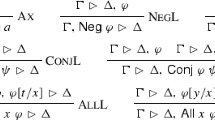Abstract
This paper presents a new proof technique for Automated Reasoning and Logic Programming which based on a generalization of the original Connection Graph paradigm of Kowalski and provides a methodology for Logic Programming in this framework.
We show how execution of a logic program can be executed in the logarithm of the number of steps taken by PROLOG and standard resolution theorem provers, or better.
This paper deals primarily with recursion, both in relation its exploitation and its explication. In dealing with explicit recursion, a modified “compartmentalized” connection graph framework emerges. In dealing with implicit recursion, a filter for the compartmentalized connection graph emerges which forces recursion to be explicitly represented.
The method is demonstrated on standard PROLOG examples.
The work reported here was in the main undertaken while the author was at Macquarie University NSW 2009 AUSTRALIA, and was supported in part by IMPACT Ltd, PETERSHAM NSW 2049 AUSTRALIA, the Australian Telecommunications and Electronics Research Board, and the Australian Research Council (Grant No. A48615954). The author is currently supported under ESPRIT BRA 3012: COMPULOG.
Preview
Unable to display preview. Download preview PDF.
Similar content being viewed by others
References
Norbert Eisinger, “Completeness, Confluence and Related Properties of Clause Graph Resolution”, Doctoral Dissertation, SEKI Report SR-88-07, FB Informatik, University of Kaiserslautern FRG (1988)
Norbert Eisinger, “A Note on the completeness of resolution without self-resolution.”, Information Processing Letters 31, pp323–326 (1989)
Robert Kowalski, “Logic for Problem Solving”, North Holland (1979)
David M. W. Powers, Lazaro Davila and Graham Wrightson, “Implementing Connectiong Graphs for Logic Programming”, Cybernetics and Systems '88 (R. Trappl, Ed), Kluwer (April 1988)
David M. W. Powers, “Compartmentalized Connection Graphs for Concurrent Logic Programming I: Compartmentalization, Transformation and Examples”, SEKI Report SR-90-16, University of Kaiserslautern FRG (1990).
David M. W. Powers, “Compartmentalized Connection Graphs for Concurrent Logic Programming II: Parallelism, Indexing and Unification”, SEKI Report SR-90-17, University of Kaiserslautern FRG (1990).
Michael J. Wise, David M. W. Powers, “Indexing PROLOG Clauses via Superimposed Code Words and Field Encoded Words”, Proc. International Symposium on Logic Programming, IEEE Computer Society, pp.203–210 (February 1984).
Author information
Authors and Affiliations
Editor information
Rights and permissions
Copyright information
© 1992 Springer-Verlag Berlin Heidelberg
About this paper
Cite this paper
Powers, D.M.W. (1992). Logic Programming with Pseudo-Resolution. In: Voronkov, A. (eds) Logic Programming. Lecture Notes in Computer Science, vol 592. Springer, Berlin, Heidelberg. https://doi.org/10.1007/3-540-55460-2_30
Download citation
DOI: https://doi.org/10.1007/3-540-55460-2_30
Published:
Publisher Name: Springer, Berlin, Heidelberg
Print ISBN: 978-3-540-55460-8
Online ISBN: 978-3-540-47083-0
eBook Packages: Springer Book Archive




